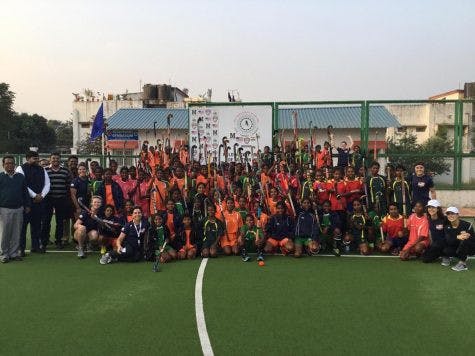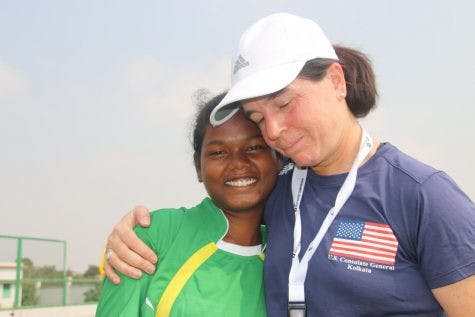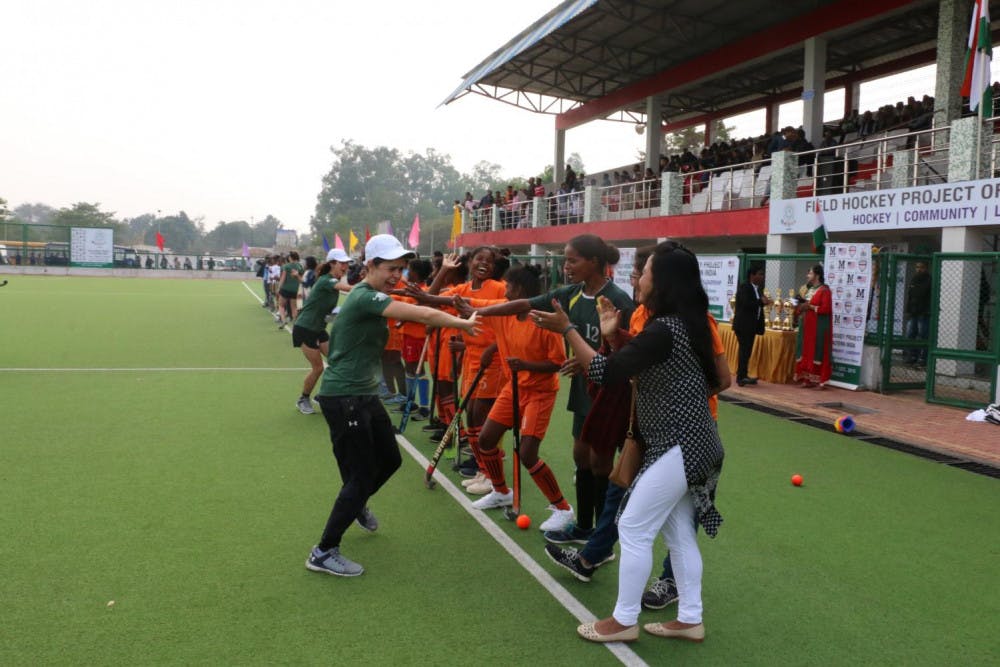When the U.S. Department of State was looking for a field hockey delegation to lead a sports envoy program in Jharkhand, India, there was an overwhelming need in the region for strong female role models. Through a serendipitous connection from Vice President for Student Affairs and Dean of Students Baishakhi Taylor, Middlebury field hockey head coach Katharine DeLorenzo jumped at the opportunity.
“Their greatest advocates need to be themselves,” she said in an interview following the trip, drawing attention to the Middlebury delegation’s role in building relationships through the program and fostering female empowerment.
From Saturday, Nov. 24 through Sunday, Dec. 2, 2018, DeLorenzo, assistant coaches Rachel Palumbo and Lauren Schweppe ’18 and field hockey alums Lauren Greer ’13, Alyssa DiMaio ’15, Anna Kenyon ’16 and Audrey Quirk ’18 led a week-long field hockey residential program in Ranchi, the capital of the Indian state of Jharkhand. Working with the U.S. State Department, the Indian consulate and the India-based anti-trafficking NGO Shakti Vahini, the East India Field Hockey Project coached 106 women aged 14 to 17 from tribal regions who were at high risk for human trafficking. Considering the hardships the young women endure throughout their lives in an impoverished and sexist society, Palumbo said that field hockey was their only true outlet; the young women would often play with sticks or other materials they could find. “I almost hesitate to say that we taught field hockey,” she said. “They’re tireless.”

Members of the East India Field Hockey Project pose for a picture during the week-long program.
Throughout daily workshops, drills, scrimmages, seminar groups and time spent off the field, the delegation focused on giving the young women tools and skills they could take with them beyond the camp and pass on to their peers. “We wanted to show them that their dreams were valid and something they can attain,” Schweppe said. Making a positive impact on their lives was a priority for DeLorenzo. “Those dreams were going to sit there and stay dreams until we kept this going,” she said.
Coming into the program, the coaches realized that their goals for the young women were more than teaching them the skills of the game; the program also focused on creating an expanded vision for themselves of their own future. One of the strategies was to reiterate that the young women could rise up in the societal ranks. “They absolutely matter, and they don’t hear that enough,” Palumbo said.
Shakti Vahini was an integral part of the planning and execution of the program, selecting individuals with the highest social standing — ones the rest of the tribe would look up to — and providing interpreters to assist the Middlebury group. Another goal of the trip was to raise awareness for human trafficking, which is at the core of Shakti Vahini’s mission statement. The organization strives for a “just, free and equitable society” through its various public advocacy campaigns and programs.
“Nari Shakti,” or “women power,” was a phrase the Middlebury coaches used often throughout the program. Reiterating these two words (often as a chant before beginning an activity) was a key strategy to ensure that every girl feels cared for, loved and empowered, since many of the young women did not have parents or siblings to rely on. “Everyone matters. They matter. I don’t think they’ve ever said those words in their life,” Palumbo said.
Through the drills and lessons on the field, the coaches employed strategies similar to coaching Middlebury athletes back in Vermont. “We definitely took the Middlebury way,” Schweppe said. The young women’s backgrounds in field hockey took the form of mostly unstructured games, as many of them have never had any formal training. “It definitely taught us the value of simplicity. We’ve been a team that has embraced that pretty well,” DeLorenzo added.

Field hockey head coach Katharine DeLorenzo embraces a young athlete.
For DeLorenzo, her first trip to Asia enabled her and the other coaches to try to change the worldview of the athletes they coached. “These young women can develop a different perspective on how they fit into the world,” she said, as tribal traditions often influenced the young women’s future goals. Out of 106 young women in the program, only one said she aspired to be an engineer; the rest believed they would grow up to be policewomen (a powerful position for women in the region) or professional hockey players. Palumbo said that despite the cultural differences and language barrier, field hockey united the coaches and players. “As soon as the whistle blew, I [was] comfortable and they were comfortable too,” she said.
Following the program, the Middlebury delegation went to watch the Hockey World Cup in Bhubaneswar, the capital of the Indian state of Odisha. In a Middlebury team dinner back on campus following the trip, the coaches showed their athletes the high level of competition present over the eight games they watched. “They cover the field,” Palumbo said.
The Middlebury delegation hopes to continue this sports diplomacy program, and its contacts on the ground in India have started to continue connections with the young women from the camp this year. One of DeLorenzo’s highlights of the program was “witnessing such a throng of people in urban India working on behalf of these young women’s betterment. This was a drop-everything; no one was focused on anything else for seven days,” she said.
“These girls have dreams in their hearts,” Palumbo said, referring to a conversation with one of the Indian facilitators of the program. “There’s so much that needs to be done.”

The Middlebury delegation poses with young women participating in the program.
Nari Shakti: Women Power

COURTESY PHOTO
Middlebury field hockey coaches and alums high-five a group of young players before a scrimmage in Ranchi.
Middlebury field hockey coaches and alums high-five a group of young players before a scrimmage in Ranchi.
COURTESY PHOTO
COURTESY PHOTO
COURTESY PHOTO
Comments



